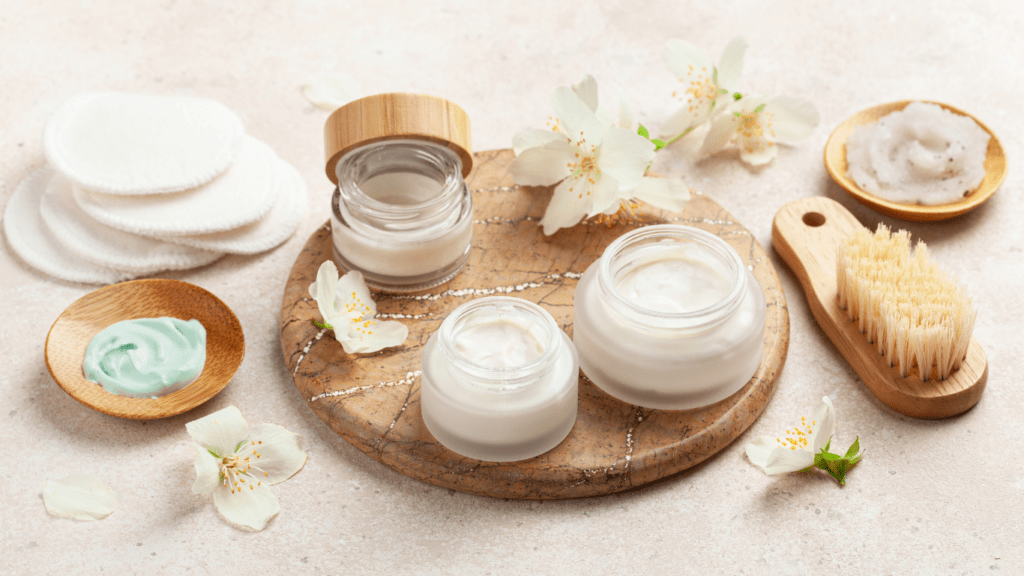Understanding Natural Beauty Products
Navigating the world of natural beauty products can be complex. It’s crucial to discern which products truly align with “natural” standards.
What Are Natural Beauty Products?
Natural beauty products contain ingredients derived from nature. These include plant extracts, minerals, and naturally occurring substances. Unlike synthetic products, they exclude artificial chemicals, fragrances, and dyes.
This makes them preferable for those seeking a cleaner, toxin-free option. Common natural ingredients include aloe vera, coconut oil, and shea butter.
Benefits of Using Natural Products
Natural products reduce the risk of adverse reactions. Artificial chemicals can cause irritation, especially for sensitive skin. Natural ingredients often have therapeutic properties, such as healing and anti-inflammatory effects.
They also offer environmental benefits. Eco-friendly production methods and biodegradable ingredients minimize ecological impact. By using natural beauty products, consumers support sustainable practices and contribute to a healthier planet.
Key Ingredients to Look For
Knowing the right ingredients ensures you select safe and effective natural beauty products.
Vitamins and Essential Oils
Vitamins A, C, and E offer anti-aging and skin-brightening benefits. Vitamin A (retinol) accelerates cell turnover, reducing wrinkles. Vitamin C (ascorbic acid) boosts collagen production, improving skin elasticity.
Vitamin E (tocopherol) protects against free radicals, preventing damage. Essential oils, such as lavender and tea tree oil, provide antimicrobial and anti-inflammatory properties.
Lavender oil soothes irritation while tea tree oil combats acne. Choose products with these ingredients for enhanced skin health.
Herbal and Plant Extracts
Aloe vera, chamomile, and green tea extracts offer therapeutic effects. Aloe vera hydrates and heals irritated skin. Chamomile soothes and calms, reducing redness and inflammation.
Green tea extract, rich in antioxidants, combats signs of aging and protects against UV damage. Products featuring these extracts support overall skin wellness.
How to Verify Product Authenticity
Choosing natural beauty products demands a careful approach to ensure authenticity. Here’s how to verify if a product is truly natural.
Reading Labels and Certifications
First, read product labels meticulously. Ingredients should be listed in descending order by weight. Look for names you recognize, like plant extracts, essential oils, and minerals.
Avoid synthetic chemicals like parabens, sulfates, and phthalates. A short, simple ingredient list often indicates fewer synthetic additives.
Certifications from recognized bodies offer additional assurance. Trustworthy certifications include USDA Organic, Ecocert, and COSMOS.
These organizations ensure products meet stringent natural and organic standards. For example, USDA Organic products must contain at least 95% organic ingredients.
Research Brands and Their Reputation
Brands with solid reputations are more likely to sell genuine natural products. Start by exploring their websites. Transparent brands provide detailed ingredient information, sourcing practices, and sustainability efforts.
Brands like Dr. Bronner’s, Burt’s Bees, and RMS Beauty are known for their commitment to natural ingredients.
Customer reviews on platforms like Amazon and Sephora provide insights into product authenticity and effectiveness. Look for consistent positive feedback regarding ingredient integrity and skin benefits.
Additionally, consider expert reviews from beauty blogs and industry publications.
Making the Right Choices for Your Skin Type

Choosing the best natural beauty products often depends on understanding your skin type. Different skin types require specific ingredients for optimal care, so correctly identifying your type ensures the best results.
Identify Your Skin Type
Determining your skin type isn’t difficult but requires attention. Typically, skin types include normal, oily, dry, combination, and sensitive. Each category has distinct characteristics:
- Normal Skin: Even texture and tone, not too oily or dry.
- Oily Skin: Shiny appearance and prone to acne.
- Dry Skin: Rough texture with possible flaking and tightness.
- Combination Skin: Oily in the T-zone (forehead, nose, and chin) and dry or normal in other areas.
- Sensitive Skin: Reacts easily to products, causing redness or irritation.
Knowing your skin type directs you toward the right products.
Recommended Products for Each Skin Type
Using natural products tailored to your skin type assures effectiveness.
- Normal Skin: Seek balanced products with hydrating ingredients like aloe vera and hyaluronic acid. Examples: Weleda Skin Food, Avalon Organics Vitamin C Renewal Cream.
- Oily Skin: Opt for lightweight, oil-free formulations with ingredients like tea tree oil and witch hazel. Examples: Desert Essence Thoroughly Clean Face Wash, Acure Incredibly Clear Mattifying Moisturizer.
- Dry Skin: Choose rich, moisturizing products with shea butter and glycerin. Examples: Dr. Bronner’s Organic Shikakai Soap, Burt’s Bees Intense Hydration Night Cream.
- Combination Skin: Use products that balance oil and hydration, containing niacinamide and jojoba oil. Examples: SheaMoisture African Black Soap, Andalou Naturals Probiotic+ C Renewal Cream.
- Sensitive Skin: Focus on gentle formulas with oatmeal and chamomile. Examples: First Aid Beauty Ultra Repair Cream, Weleda Sensitive Care Facial Lotion.
Selecting specific products based on skin type enhances the benefits of natural ingredients.
Where to Buy Natural Beauty Products
Deciding where to buy natural beauty products involves considering options like online retailers and local stores. Each has its advantages and constraints.
Online Retailers vs Local Stores
Online retailers offer convenience and a wider selection. Websites like Amazon, Sephora, and iHerb feature many natural beauty brands. E-commerce allows easy comparison of prices and reviews. However, verifying product authenticity online can be challenging, making it essential to purchase from reputable sites.
Local stores provide immediate access to products. Specialty shops and health food stores often carry natural beauty lines. You can read labels and ask staff for recommendations.
Unfortunately, local stores may have limited stock and higher prices compared to online options. Visiting a trusted local store ensures product authenticity.
Tips for Safe Online Purchases
First, buy from official brand websites or well-known marketplaces to avoid counterfeit products. Check customer reviews for insights into product effectiveness and seller reliability.
Look for certification logos like USDA Organic or Leaping Bunny, which indicate adherence to natural and cruelty-free standards.
Second, examine return policies. Reliable online retailers offer hassle-free returns if products don’t meet expectations. Lastly, consider shipping costs and times. Some websites provide free or expedited shipping for orders over a certain amount, enhancing overall value.
 Heather Smithkers - Innovative Eco-Author at Green Commerce Haven
Heather Smithkers is a creative and forward-thinking author at Green Commerce Haven, where she brings a unique perspective to the world of sustainability. With a flair for storytelling and a deep commitment to environmental advocacy, Heather crafts engaging content that resonates with eco-conscious readers. Her work delves into the latest trends in green startups, organic products, and sustainable living, offering fresh insights and practical advice. Heather’s innovative approach to writing helps demystify complex environmental topics, making them accessible and inspiring to a broad audience.
Heather Smithkers - Innovative Eco-Author at Green Commerce Haven
Heather Smithkers is a creative and forward-thinking author at Green Commerce Haven, where she brings a unique perspective to the world of sustainability. With a flair for storytelling and a deep commitment to environmental advocacy, Heather crafts engaging content that resonates with eco-conscious readers. Her work delves into the latest trends in green startups, organic products, and sustainable living, offering fresh insights and practical advice. Heather’s innovative approach to writing helps demystify complex environmental topics, making them accessible and inspiring to a broad audience.
